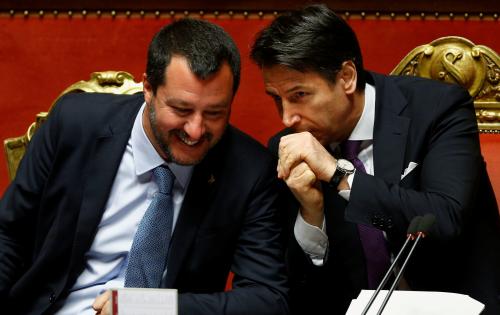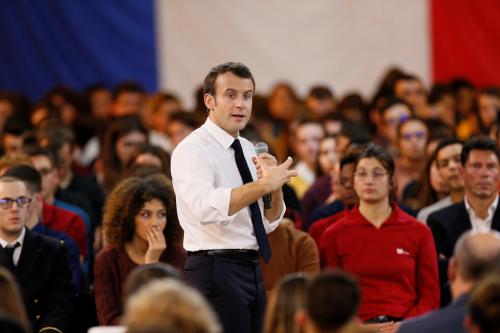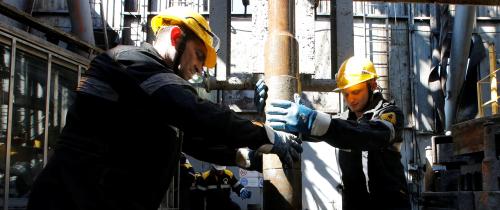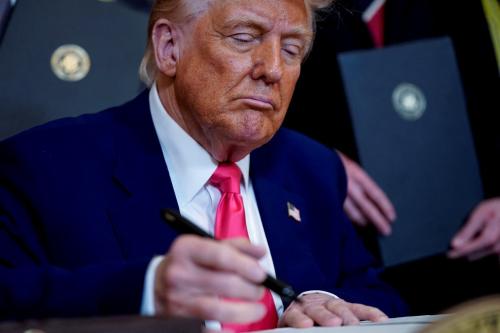The inter-European and trans-Atlantic tensions created by Nord Stream 2 over differing and at times contradictory European approaches to Russia look set to last, as the project shows little sign of being withdrawn soon, argues Giovanna De Maio. This post originally appeared in the Georgetown Journal of International Affairs.
From its inception, the construction of the Nord Stream 2 pipeline has triggered a controversial debate in the European Union and the United States. Sponsored by the Russian Gazprom (which is the sole shareholder), the German Wintershall and Uniper, the French ENGIE, the Austrian OMV, and Royal Dutch Shell, the Nord Stream 2 is expected to extend and double Nord Stream 1’s existing capacity, transporting Russian gas directly to Germany via the Baltic Sea.
While the EU Council has just established that pipelines with third countries must comply with EU gas rules, it remains unclear how this will impact Nord Stream 2––specifically, whether the pipeline will get an exemption or if its construction will be significantly delayed.
What is certain is that the political concerns the Nord Stream 2 project has raised over the years have not faded away. Building this pipeline not only involves European companies purchasing Russian gas at a time when the EU is targeting Russia with political and economic sanctions. It also implies bypassing Ukrainian territory that, so far, has been the main route for Russian gas supplies to Europe.
For these reasons, Nord Stream 2 is not just an economic project. Rather, its construction fundamentally redefines, and calls into question, the EU’s overall approach toward Russia and Ukraine, highlighting the divergence of interests amongst EU member states and exacerbating tensions between the EU and the United States.
Contradictory Approach Toward Ukraine and Russia
When completed, this pipeline would, at its full capacity, create a permanent alternative export route to the Ukrainian pipeline system and would eventually result in Kiev losing over $ 2 billion per year in transit costs.
Under these circumstances, Germany occupies an uncomfortable position. On the one hand, Chancellor Angela Merkel has been successful in building a consensus among EU member states to introduce sanctions against Russia after Moscow annexed Crimea in 2014 and instigated conflict in Eastern Ukraine. Complicating Berlin’s position, however, is the growing influence of some German political stakeholders who have advocated for a more cooperative approach with Russia. They see this project as largely beneficial to Germany’s energy market in terms of security of supplies and its potentially key role in determining gas prices in Europe.
Although the Nord Stream 2 consortium of German and Russian companies repeatedly claim that their project has wholly economic motives, the pipeline’s political implications are paramount. Proceeding with Nord Stream 2 risks weakening the credibility of both the EU’s sanctions regime against, and overall policy toward, Russia.
EU Inter-State Divide
The Czech Republic, Hungary, Poland, the Slovak Republic, Romania, Estonia, Latvia, Lithuania, and Croatia––all highly dependent on Russian gas––signed a petition against Nord Stream 2 in March 2016, highlighting the risks for energy security in Central and Eastern Europe.
Italy is in a similar bind. Russia is Rome’s main supplier of natural gas, most of which is delivered through Ukraine. If Ukraine’s transit routes are compromised, most Italian gas supplies would have to pass through Germany, unduly extending Berlin’s leverage over the Western European energy market.
In 2015, Italy accused the EU Commission of applying double-standards when the Commission did not reject the Nord Stream 2 project, as it did with the South Stream––a project which would have benefited Italy’s role as energy hub in the Mediterranean. For this reason, Italy complained about Germany’s influence in the EU Commission and called for equal treatment.
France, meanwhile, has opted for a less hostile attitude towards Germany’s support for Nord Stream 2 in the EU Commission. The country has the second-largest number of votes after Germany in the Commission, and the two reached a compromise on amendments to the Third Energy Package regulations so that the construction of Nord Stream 2 pipeline remained viable. According to some, France opened up on this dossier as an incentive for an unrelated negotiation with Germany on EU and Eurozone-related topics (in line with President Emmanuel Macron’s vision of a more integrated currency union).
Tensions with Washington
Nord Stream 2 has also become an issue of dispute between Europe and the United States, casting doubts on trans-Atlantic security ties.
In his speech at the NATO Engages event in Washington, D.C.,Vice President Mike Pence echoed President Trump’s allegations at the NATO summit in July that Berlin’s dependence on Moscow for its energy supplies would increase to a point at which Germany would be “totally controlled by Russia.” Significantly, in this context, Trump has threatened to withdraw U.S. security protection for Europe if Brussels does not block the construction of the pipeline. The potential for U.S. sanctions on the German companies involved in the construction of Nord Stream 2 only further exacerbates mistrust on both sides of the Atlantic. It is also important to note, though, that, in pushing key NATO allies to reduce energy dependence on Russia, Trump may have had an ulterior motive: namely, to encourage Europe to meet its energy needs through imports of U.S. liquefied natural gas (LNG).
The Nord Stream 2 saga is not over yet, but its impact has already been harmful. On the EU side, it exposes divisions in regard to Russia policy, particularly when lucrative business interests are on the line. On the trans-Atlantic side, Nord Stream 2 highlighted the current political fractures that have fueled doubts about the United States’ commitment to European security.
As it looks like the Nord Stream 2 project will not be withdrawn anytime soon, the only way to preserve the EU consistency over its approach towards Russia and Ukraine would be providing Kiev with reverse flow gas supplies and supporting the upgrading of its existing pipeline system. As for internal divisions and transatlantic fatigue on this issue, Nord Stream 2 will keep on creating tension for a long time to come.
The Brookings Institution is committed to quality, independence, and impact.
We are supported by a diverse array of funders. In line with our values and policies, each Brookings publication represents the sole views of its author(s).











Commentary
Nord Stream 2: A failed test for EU unity and trans-Atlantic coordination
April 22, 2019